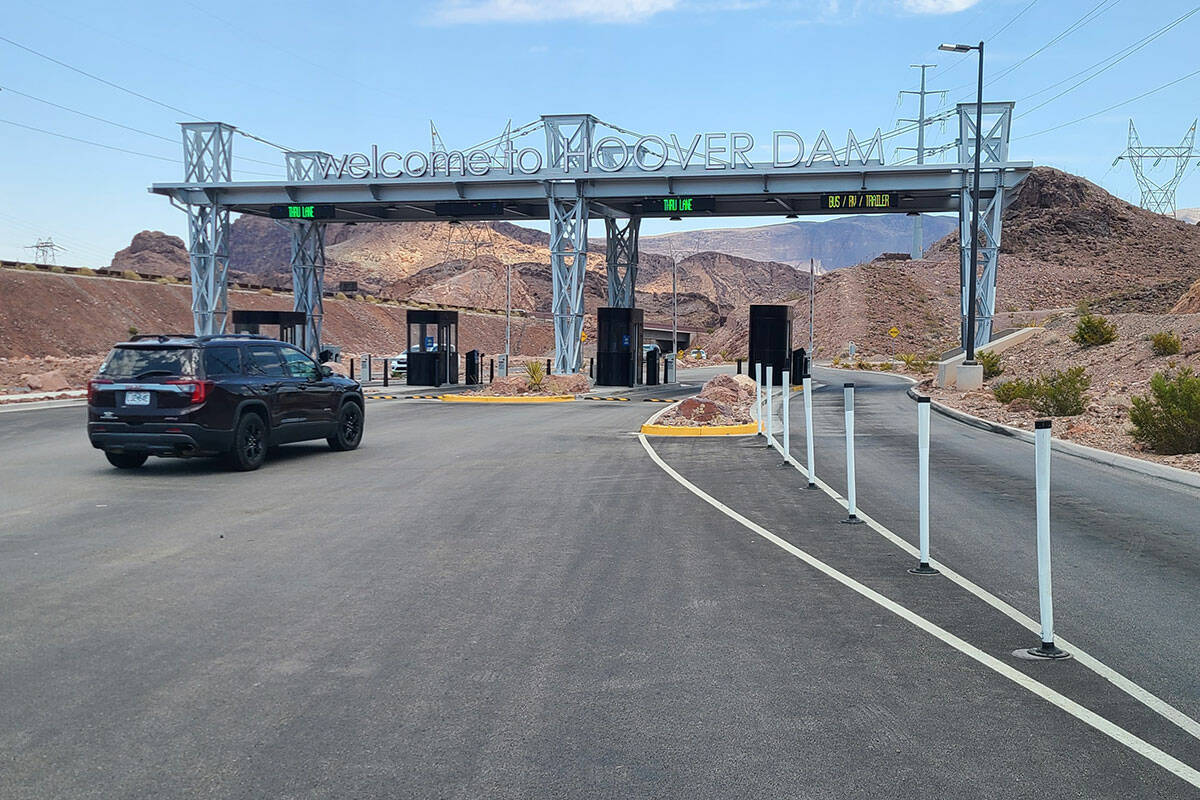What we know — and don’t know — about the new Hoover Dam toll plaza

For decades, travelers have visited Hoover Dam, one of the nation’s premiere engineering feats and a Southern Nevada tourism staple, for free.
Today, it’s unclear how long it will remain a free attraction as the Bureau of Reclamation has built a toll plaza just beyond a security checkpoint near the dam.
So far, the plaza gateway is inactive and vehicles can pass through it once they’ve cleared security.
Michelle Helms, regional chief of the office of communications for the Bureau of Reclamation’s Lower Colorado Basin, said in an email that Hoover Dam charges a use fee for commercial road-based tour operators in compliance with federal regulations.
“We don’t have congressional authorization to charge an entry fee for non-commercial vehicles,” she said.
Helms said she has not been briefed on any plans involving charging non-commercial vehicles.
The new turnstile also means visitors may eventually have to pay to access the walkway for the Pat Tillman-Mike O’Callaghan Memorial Bridge over the Colorado River from which pedestrians can get a breathtaking view of the massive, 726-foot concrete arch-gravity dam, which was completed in 1936 during the Great Depression after five years of construction.
Also beyond the turnstile is a parking area where hikers can access the 3.7-mile historic railroad tunnel trail that offers views of Lake Mead.
The Bureau of Reclamation office that handles commercial use permits for Hoover Dam did not respond to telephone and email inquiries about why the plaza was built, how much it cost or when it would be activated.
Hoover Dam bypass
The road to Hoover Dam, formerly U.S. 93, was identified in the 1960s as dangerous and inadequate to handle projected traffic volumes.
In the late 1990s, work began to develop a bypass of the route to what is now Interstate 11. The need for a bypass was accelerated by the 9-11 tragedy when checkpoints were established to monitor U.S. 93 traffic driving across the dam.
The bypass project began in 2003 with bridge approaches and bridge construction began in 2005. It was completed and opened to vehicle traffic on Oct. 19, 2010, at a cost of $240 million, with the bridge itself costing $114 million.
Today, tourists can still drive across Hoover Dam to parking lots on the Arizona side of the Colorado River. But the old highway is blocked and motorists must return over the dam to the Nevada side to exit.
Commercial use authorizations are required of vehicles that transport tourists and goods to the dam area. Tour buses are among the vehicles required to pay a daily fee at a rate of $5 per passenger.
The Bureau of Reclamation first began collecting fees from commercial operators in 2020.
Non-commercial educational groups are not required to pay a fee. Commercial authorizations generally cost $100 per application and must be renewed annually and daily uses have been paid in advance online.
About 32,000 commercial vehicles visit Hoover Dam each year, bringing an estimated 800,000 visitors to the dam.
Fees collected are used for upkeep of Hoover Dam visitor facilities.
Contact Richard N. Velotta at rvelotta@reviewjournal.com or 702-477-3893. Follow @RickVelotta on X.